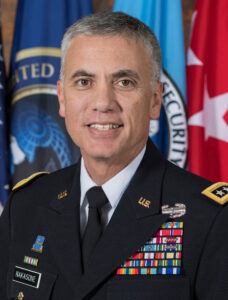The Worries of a Retiring NSA Chief
Gen. Paul M. Nakasone, who recently retired as director of the National Security Agency, is worried. He’s worried about terrorism, drug cartels, Russia, China, hackers, spies, and other scary things. His many worries are detailed in an op-ed he has in the Washington Post today entitled, “What Worries Me Most After Five Years as Leader of the NSA.”
Surprisingly, for some unknown reason, Nakasone expressed no worry whatsoever about the “invasion” of illegal immigrants on our southern border. Wouldn’t you think that a career military man and the head of the NSA would be worried about an ongoing “invasion” of our nation? Sounds like a grave case of military malpractice to me.
 Nakasone’s role as a military general helps to remind us of the gigantic military-intelligence establishment that controls our country. It’s easy to view the Pentagon, the CIA, and the NSA as three separate and distinct entities. In actuality, they are three parts of an overall entity known as the national-security establishment. It is one gigantic military-intelligence entity that is simply divided into three parts — the Pentagon, the CIA, and the NSA.
Nakasone’s role as a military general helps to remind us of the gigantic military-intelligence establishment that controls our country. It’s easy to view the Pentagon, the CIA, and the NSA as three separate and distinct entities. In actuality, they are three parts of an overall entity known as the national-security establishment. It is one gigantic military-intelligence entity that is simply divided into three parts — the Pentagon, the CIA, and the NSA.
Longtime readers of my work know that I have long recommended a book entitled National Security and Double Government by Michael J. Glennon, who is a professor of law at Tufts University and former legal counsel to the Senate Foreign Relations Committee. Glennon’s thesis, to which I subscribe, is an ominous one: The national-security establishment — not the president, Congress, or Supreme Court — runs the federal government, especially when it comes to foreign affairs.
The federal government was not always a national-security state. For more than 150 years, Americans lived under a type of governmental structure known as a limited-government republic.
The difference between a limited-government republic and a national-security state is day and night. The powers of a limited-government republic are limited to those enumerated in the Constitution and are also restricted by the Bill of Rights. The powers of a national-security state are omnipotent and unrestricted by anything, including the powers of torture, assassination, and indefinite detention, not to mention coups, invasions, occupations, and wars of aggression.
Fear (and worry) is the coin of the realm in every national security state. The more people are afraid, the more they will look to the national-security establishment to keep them safe. That ensures the continued existence of the national-security establishment as well as ever-increasing taxpayer-funded largess.
Thus, crises become a core feature of every national-security state, especially crises that are generated by the national-security establishment itself.
Consider the 9/11 attacks, which form a core feature of Nakasone’s op-ed. Nakasone emphasizes his deep worry about another terrorist attack similar to those on 9/11. What he doesn’t mention, however, is that those 9/11 attacks were the direct consequence of foreign interventionism in which the national-security establishment had been engaged prior to those attacks. In other words, as Ron Paul once put it, they came over here to kill us because U.S. national-security state personnel were over there killing them.
Or consider Nakasone’s worries about Russia. It was the Pentagon, operating through NATO, that violated a pledge that U.S. officials made at the end of the Cold War to not expand that NATO Cold War dinosaur eastward. Instead, the Pentagon had NATO absorb former members of the Warsaw Pact, with the ultimate aim of threatening to absorb Ukraine, which the Pentagon knew would incite a Russian invasion of Ukraine. Voila! Another crisis, coming coincidentally on the heels of a disastrous end to the 20-year U.S. war in Afghanistan that was waged by the U.S. national-security establishment.
Consider Nakosone’s worries about China. Once again, we see that the crisis with China has been generated first by a trade war that was initiated by the U.S. government, only to be followed by inciting tensions and a crisis over Taiwan.
On those drug cartels that have Nakosone worried, there is a quick and easy way to dispel that worry: End the drug war by legalizing drugs. Those drug cartels would immediately disappear and Nakasone would no longer have to worry about them.
As I have long maintained, the biggest mistake our nation has ever made was to convert the federal government into a national-security state. That’s why we are now living lives characterized by perpetual crisis, chaos, death, suffering, and the destruction of liberty. That’s also so many Americans, including Nakasone, live lives filled with worry. The best thing we could ever do is dismantle the national-security establishment and toss it into the dustbin of history and restore our founding system of a limited-government republic to our land.


